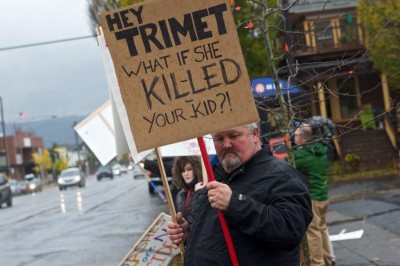
David Sale has been a builder his whole life, a carpenter who went from small jobs to steering his own multi-unit housing development. But the biggest project of his career has been one he didn’t choose: rebuilding his life after losing his second child, 22-year-old daughter, Danielle, in a bus crash.
The crash, which happened April 24, 2010, took the life of not only Danielle but that of another young woman, Jenee’ Hammel, and it left Danielle’s then boyfriend, Erik Gitting, with horrific injuries. Two others were struck but got away with relatively light injuries. The crash went down as the “worst tragedy in TriMet’s history” — in the words of the company’s own CEO.
The calamity unfolded just before midnight as driver Sandi Day was finishing her shift in Portland Old Town on a bustling Saturday night. A show had just let out at nearby Harvey’s Comedy Club, and Danielle and Erik were part of the crowd leaving the venue.
As the five waited to cross NW Broadway on Glisan, the bus was on the opposite side of Glisan letting off a passenger at an unmarked stop. The problem was that the route turns left on Broadway so Day should have been stopped in the left lane. A left turn from the curb was not only hazardous but illegal. But she did it anyway, sweeping across four lanes of traffic and into the intersection, where she plowed into the five unwitting pedestrians. According to Day’s court testimony, she wasn’t aware she’d hit anyone until she saw Danielle’s hair on her windshield.
Sale didn’t learn about Danielle’s death until the following morning. A preacher came to the door, and Sale could see the man’s car was parked across his driveway with the door wide open. Something was up.
Sale was home with his whole family — his wife and three other children. “I just lost it,” Sale said. “I pretty much collapsed on the front lawn.” As he recalls the memory, he stops and looks away for minute, regaining his voice. “It was a very rough day.”
Sale still wonders precisely when Danielle died. “Was it while she was stuck under the bus? Or while she was lying on the sidewalk, with a neck brace and a backboard and an IV stuck in her arm? That’s the last picture I have of my daughter.”
Later there was the visit to the hospital’s ICU, where Danielle’s boyfriend was being treated. “I was holding Erik’s hand and making decisions about organ donations and how people can benefit from my daughter’s death,” Sale remembers.
“She was so torn up, the mortician said if we wanted an open casket, we’d have to have the guests sign a release. So we just had a closed casket. I never saw her again.”
FROM ANGUISH TO ACTIVISM
After Danielle’s death, Sale went on the warpath — determined not only to find justice, but to change the system so tragedies like Danielle’s wouldn’t happen again. He started with the justice system itself. Sandi Day had been convicted of several violations, including an illegal left turn and six counts of careless driving. But for all the devastation, she got away with an $1,100 fine and 200 hours of community service. Day automatically lost her commercial driver’s license in Washington State. But 10 days later, she got it back in Oregon. “Ten days!” Sale says, still amazed.
Enraged that Day was reinstated so quickly, Sale went straight to the top. Oregon Gov. John Kitzhaber was attending in Vancouver, WA, where the Sales live, and Sale went there to introduce himself. Sale told the governor he was the father of one of the TriMet bus victims and that he wanted a private meeting. Kitzhaber took Sale’s business card and handed it off to an assistant. Sale took out another card, stuffed it in Kitzhaber’s shirt pocket and said: “I’ll expect to hear from you SOON.”
Although Sale did get his meeting, the effort to stiffen Oregon’s licensing procedures came to nothing. Sale was not discouraged.
His family established a foundation, Dani’s Wish, to make anonymous donations to parents experiencing the sudden loss of a child. The donations aren’t huge, but they help defray funeral expenses of families who have plenty of other burdens. Sale raises money for the effort by running a non-profit mobile restaurant in a red, double-decker bus.
All the families filed a lawsuit against TriMet and the manufacturer of the bus that hit Danielle, and the two defendants ended up paying out $2 million each to the victims’ families.
One of the main arguments in the lawsuit was that the buses have a design flaw that obstructs drivers’ views. The left rear-view mirrors and “A pillars” — the posts on either side of the windshield that support the bus’s roof — form a 1.5 feet wide barrier that can compromise the safety of left turns.
To prove his point, Sale cited an experiment conducted on a public bus in Seattle where a camera was set up directly behind the driver to capture what they can see. At one point during the filming, the driver is making a left turn in a busy area, and as he steers into the cross street, a little kid darts outside the crosswalk into the driver’s field of vision. The bus screechs to a stop before striking the child — or the child’s family, who the driver hadn’t even noticed. “It’s like, ‘Oh! Didn’t see that,’” Sale says. “The only way he saw it, as you see in the video, was because the little kid got away from the rest of the group and ran in front of the bus.”
In the spring of 2013, Sale was invited to Philadelphia by the drivers’ union there (SEPTA) to help press home this very point to the city bus operator. The driver POV video of the unseen pedestrians made a big impact: The city changed the mirrors on more than 500 buses “just because I went to Philadelphia,” Sales says.
BLOOD IN THE GAME
Publicity of the TriMet tragedy touched others in the transit industry. Among them were a Ohio-based company that delivers driver training programs, TAPTCO. They needed help with new course material, and Sale ended up putting together a half dozen “impact” videos to show bus drivers what can happen when complacency sets in. The training is used today by more than 450 public transit companies nationwide.
Sale continues to attend monthly TriMet Board meetings when he can to argue for better driver training, more strenuous pre-trip vehicle checks and better working conditions for drivers. Operator behavior is a major focal point of his advocacy. It was at a TriMet Board meeting that he met Darla Sturdy, whose son Aaron was struck and killed by a TriMet light-rail train in 2003. Sturdy and Sale are the only members of Families for Safe Streets who lost children in public transit crashes. Most members lost their loved ones in crashes involving private cars — including a fair few connected to drunk driving.
But the unexpected loss of a child is a common bond, and Sale likes to help other parents in their grief. Doing so helps in his own recovery. “It’s hard for people to step out of their comfort zone when something like that happens to your kid — or any family member, for that matter,” Sale says. “But with a kid, it might be a lot harder.”
